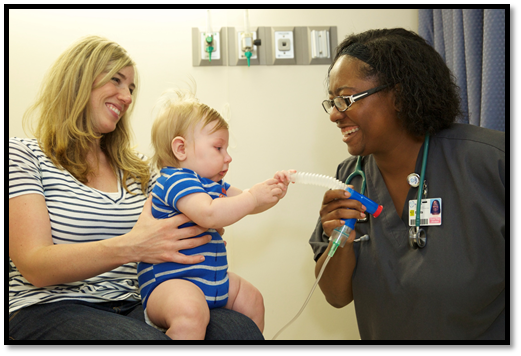
Respiratory Care Program
Information Conference
At 9:32 a.m., Bonita helped a baby boy breathe easier
She is a respiratory care student

What did you accomplish this morning?

Welcome

Is respiratory care right for me?
With all the healthcare professions out there, how can you know which one is right for you? It's not an easy decision, but if you agree with the following statements, you might discover respiratory care is exactly what you've been looking for.
____ I really enjoy helping people in their time of need.
____ I like working with technology and I'm good in math and science.
____ I would rather work in a profession where there is a lot of variety on the job.
____ I want to be able to choose what type of place I work in, and the type of patients I work with.
____ I'm looking for a career with multiple opportunities for advancement.
RTs are some of the most tech savvy employees in the job market, and their patients are their top priority.

What do respiratory therapists do?
A day in the life of an RT might include:
It is very important to do your research regarding your career. In order to give you a better understanding of what we do, please watch this video presentation from the
American Association for Respiratory Care.

What is the demand for RTs?
Employment opportunities are excellent! Consult the Bureau of Labor Statistics-Occupational Outlook Handbook below.
http://www.bls.gov/ooh/healthcare/respiratory-therapists.htm
Program personnel informs students of communications received from employers regarding job openings.

Now that you are giving respiratory care serious thought as a career direction, the next leg of the journey is finding out what it takes to complete your respiratory care degree and to get started making a living in a very rewarding field.
Consider the Respiratory Care Program at Lincoln Land Community College
|
|
Our goal is to prepare graduates with demonstrated competence in the knowledge, skills, and behavior learning domains of respiratory care practice as performed by registered respiratory therapists (RRTs)
Sixty-five credit hour curriculum leading to an Associate Degree in Applied Sciences. A class of sixteen (16) students begin the program every fall semester. The program is five (5) semesters in length. The coursework is intense. It is possible to have at least 3 tests per week. Our students start clinical in the hospitals during the 9th week of the first semester.
|

Are there advancement opportunities after completing the Respiratory Care Program at LLCC?
Yes! Advancement opportunities exist in management, education, research and consultation work. We encourage our graduates to become leaders in the respiratory care profession through continuing education, research, learning new skills and by joining and participating as active members of our field's professional organizations such at the American Association for Respiratory Care.
You may also consider advanced training and credentials in the following areas: Neonatal/Pediatrics, Pulmonary Function Testing, Adult Critical Care, Sleep Studies, and Asthma Education.
There are Bachelor Degree programs in Respiratory Care designed for the practicing registered respiratory therapist with an associate's degree from a regionally accredited intitution such at LLCC. Most programs are delivered entirely online, giving you the flexibility to continue to work as a respiratory therapist while you continue your education.
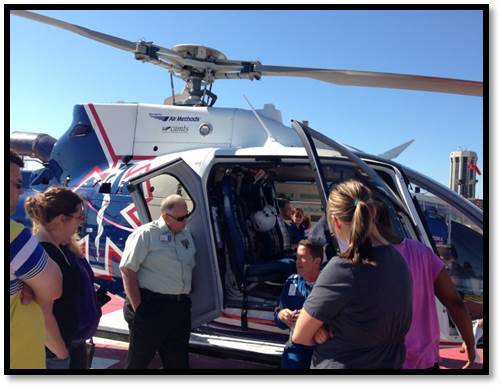
Respiratory Care Students enjoying class outside, while learning about transporting patients by helicoptor from the Saints Flight crew at St. John's Hospital.

Is this program accredited?
We are fully accredited by the Commission on Accreditation for Respiratory Care.
Click on to the picture below for Programatic Outcomes as provided by the Commission.
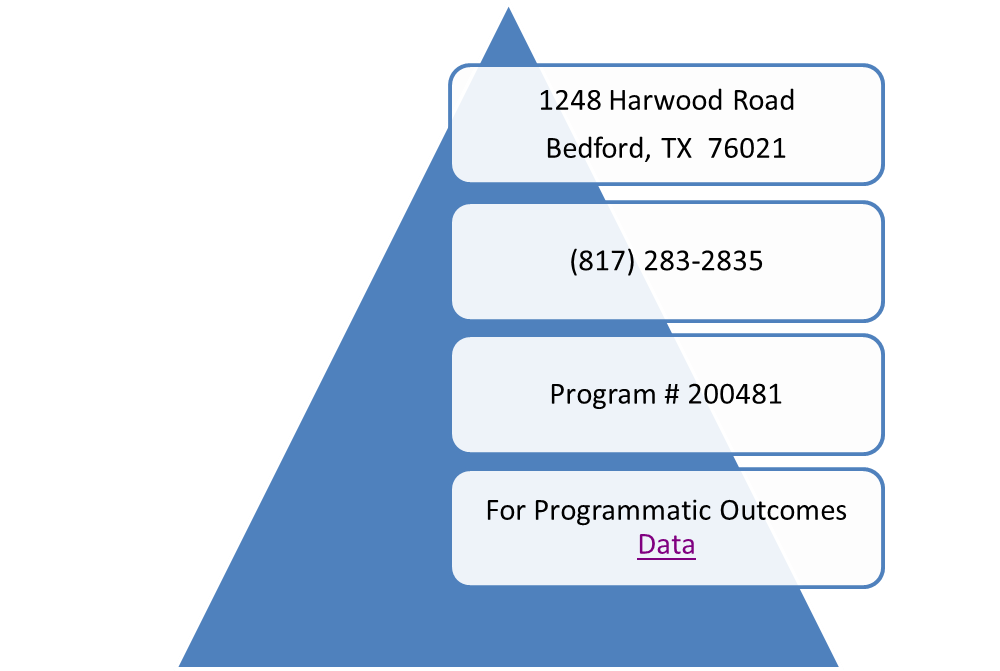
Class of 2018 outcomes:
Job Placement 100% CRT 100% RRT 88%

How do I become a credentialed practititoner?
National Credentialing Exams
Our graduates are eligible to take the Therapist Multiple Choice (TMC) exam from the National Board for Respiratory Care (NBRC). The TMC examination is designed to objectively measure essential knowledge, skills, and abilities required of entry-level respiratory therapists, as well as determne eligibility for the Clinical Simulation Examination. There are two established cut scores for the Therapist Multiple-Choice Examination. If a candidate achieves the lower cut score, they will earn the CRT credential. If a candidate achieves the higher cut score, they will earn the CRT credential AND become eligible for the Clinical Simulation Examination. Upon successful completion of the Clinical Simulation Examination, the graduate will be awarded the Registered Respiratory Therapist (RRT) credential.
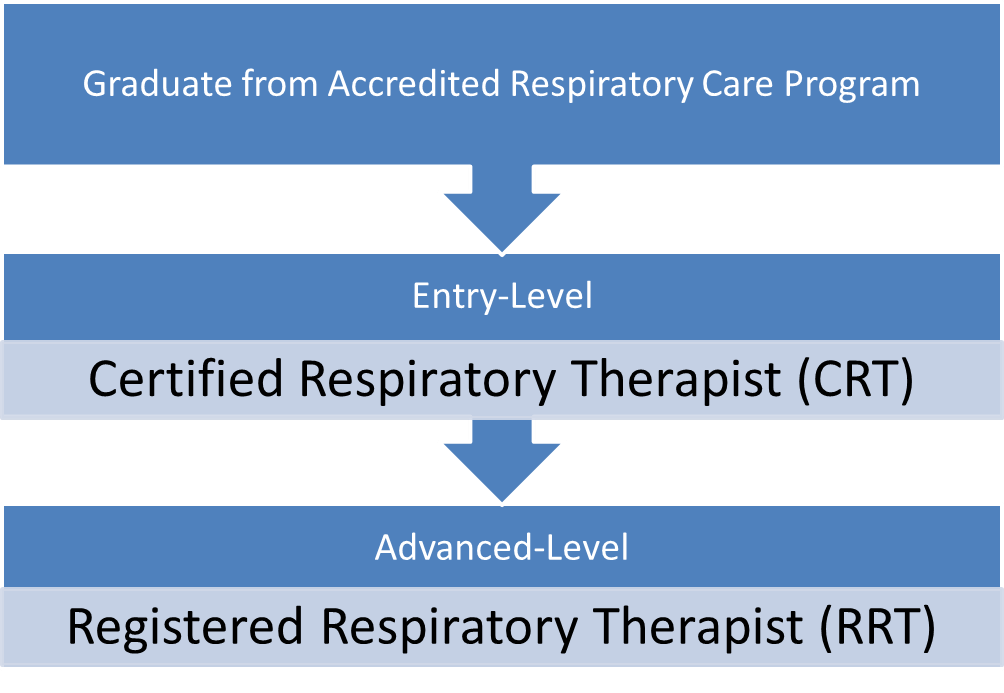
RRTs usually earn more than CRTs.
Most employers prefer to hire RRTs.

Are respiratory care practitioners licensed?
Yes. Upon successful completion of the CRT, graduates are eligible to apply for licensure in the State of Illinois. Graduates planning to practice in another state after graduation, will need to do some research regarding pre-requisites for licensure in that state.
Please be advised that any previous felony conviction may result in the inability to obtain a license to practice respiratory care.

What are the physical requirements?
•Bilateral hand and arm dexterity necessary to perform such procedures as chest physical therapy, moving equipment, CPR, etc.
•Stand and walk for long periods of time to perform various therapies.
•Ability to move quickly to reach the location of any emergency.
•Ability to bend, stoop, stand and lift for equipment and patient handling.
•Adequate hearing for communication with patients and other personnel, chest auscultation and monitoring alarms.
•Adequate vision for visual observation of the patient, performing necessary paperwork, viewing computer data, reading medical records, medication labels and utilizing and monitoring equipment.
•Ability to communicate effectively with patients and healthcare providers.
•Ability to work with potential exposure to hazards [e.g., tuberculosis, other infectious diseases, and blood-borne pathogens]
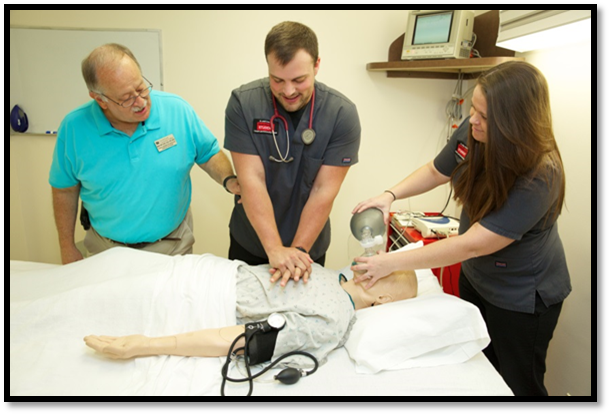

What are the academic requirements?
Please refer to the checklist below. Move mouse cursor over document to scroll.

What courses will I be taking?
Consult the LLCC Catalog for Course Descriptions. (Curriculum is subject to change)
|
FALL 1 SEMESTER |
SPRING 1 SEMESTER |
|
Courses |
Credit Hours |
|
Courses |
Credit Hours |
|
RCP 110 |
4 |
|
RCP 120 |
3 |
|
RCP 111 |
6 |
|
RCP 121 |
2 |
|
RCP 119 |
2 |
|
RCP 122 |
3 |
|
BIO 175 |
4 |
|
RCP 129 |
3 |
|
Total |
16 |
|
BIO 176 |
4 |
|
|
|
Total |
15 |
|
SUMMER |
|
Courses |
Credit Hours |
|
RCP 231 |
4 |
|
RCP 239 |
3 |
|
Total |
7 |
|
FALL 2 SEMESTER |
|
SPRING 2 SEMESTER |
|
RCP 241 |
2 |
|
RCP 250 |
4 |
|
RCP 242 |
3 |
|
RCP 259 |
6 |
|
RCP 249 |
3 |
|
ENG 102 |
3 |
|
ENG 101 |
3 |
|
Total |
13 |
|
PSY or SOC 101 |
3 |
|
|
|
|
Total |
14 |
|
|
The respiratory courses (RCP) classroom and lab are taught at the St. John's Hospital campus in Springfield Illinois.

What is the class and clinical schedule like? (Subject to change)
Clinical times vary, but typically: 6 a.m. to 6 p.m. There will be some 8 hour shifts. Clinical shifts for the first semester start during the 2nd half. Clinical shifts for the remainder of the program start the first week of the semester.
|
FALL 1 |
|
MONDAY |
TUESDAY |
WEDNESDAY |
THURSDAY |
FRIDAY |
|
8:30-noon Lab Session |
8:30 am to 12:45 pm Class |
8:30 am to 12:45 pm Class |
|
Students are scheduled approximately one clinical shift per week on a Monday or Thursday during the second-half of the semester. |
|
SPRING 1 |
|
MONDAY |
TUESDAY |
WEDNESDAY |
THURSDAY |
FRIDAY |
|
8:30 am -12:45 pm Class/Lab Session |
8:30 -11:15 am |
8:30 -11:15 am Class |
|
Students are scheduled approximately one clinical shift per week on a Monday or Thursday. |
|
SUMMER |
|
MONDAY |
TUESDAY |
WEDNESDAY |
THURSDAY |
FRIDAY |
|
8:30 am to 3:00 pm |
Clinical Day |
Clinical Day |
College Closed |
|
Students are scheduled two clinical shifts per week on Tuesdays and Thursdays. |
|
FALL 2 |
|
MONDAY |
TUESDAY |
WEDNESDAY |
THURSDAY |
FRIDAY |
|
8:30 am to 12:15 pm Class/Lab |
|
|
8:30 am to 12:15 pm |
|
Students are scheduled approximately two clinical shifts per week on a Tuesday, Wednesday or Friday. |
|
SPRING 2 |
|
MONDAY |
TUESDAY |
WEDNESDAY |
THURSDAY |
FRIDAY |
|
8:30 am to 12:30 pm Class |
|
Students are scheduled approximately two clinical shifts per week on a Tuesday, Wednesday, Thursday or Friday. |

What evaluation methods are used?
The syllabus for each course in the curriculum provides a listing of evaluation methods specific to that course (e.g., written examinations, research papers, case studies, homework assignments, etc.). Other evaluation methods used throughout the program are as follows:
PROCEDURAL ASSESSMENTS-Lab
Students must successfully complete laboratory exercises before performing clinical procedures on patients.
PROCEDURAL ASSESSMENTS-Clinical
After classroom and laboratory instruction and clinical experience with patients, students are required to demonstrate clinical competency by passing procedural assessments on various respiratory therapy clinical procedures and equipment.
PROFESSIONAL BEHAVIOR/CLINICAL PERFORMACE EVALUATIONS
Students must demonstrate clinical competency and professional behavior in both the clinical and classroom settings by passing end-program evaluations prior to graduation.
COMPREHENSIVE FINAL EXAMINATIONS
Students must pass comprehensive final exams in order to be eligible for graduation from the program. Specific information regarding the final will be provided in the RCP 250 course syllabus.

What can I do to be a successful student?
|
|
It is vital that students take responsibility for their learning!
By coming to class prepared, students are taking an active role in their learning. Students should review the course syllabi for the information needed to successfully complete each course. The prescribed instructional methods are used because they are effective and get the student involved in learning.
We believe that it is essential to use a variety of learning experiences in order to prepare our graduates for the professional work world. After graduation, self-learning may be needed to meet job requirements or for continuing education requirements. Hospital in-service programs and orientations use computer-based instruction, online activities, and traditional lectures. Many such presentations are mandatory, and it's not possible to choose between presentation styles. Increasingly, graduates are expected to self-teach using material on the internet. Graduates will have to be able to learn in all possible formats such as those used in these courses.
Students are encouraged to seek out additional help from the instructor on a topic or procedure if needed. Students demonstrating insufficient knowledge of a topic or procedure may be required to attend a help session. This is not meant to be punitive, but rather to get students on track before they fall very far behind.
Because of the intensity of the program, students are discouraged from working full-time during the course of their studies. Students may maintain paid employment during the course of the program with the understanding that their commitment to the program must always take precedence over any commitment to their place of employment. Working at paid employment will not be accepted as an excuse for missing any time in the class, lab or clinical areas. Study-Study-Study!!! |

What are some program policies that I should be aware of before I start?
Program policies apply to all students. Upon reasonable notice the program reserves the right to change policies and requirements as may be necessary to maintain proper educational standards and objectives. Students are required to comply with policies and procedures of the clinical sites. This includes policies regarding patient procedures, safety, infection control, fire safety, equipment management, and department procedures. Orientation activities will be conducted for the clinical sites.
Attendance Policy
Punctuality and dependability are essential attributes of a respiratory therapist . In order to keep up with schoolwork and to demonstrate suitability for future employment, students are expected to be present at school when scheduled.
Students are expected to attend all respiratory classes, labs and clinical days for which they are registered. This is an intense program that requires not only classroom knowledge, but an application of knowledge to the clinical skills lab and clinical sites.
Any student missing more than 15 absences (maximum allowed for the entire program) for any reason will be dropped from the program.
Substance Abuse Policy
The safety of patients is greatly influenced by the cognition and behavior of the respiratory care students taking care of them. The nature of substance abuse includes denial and a pervasive inability to think and behave logically.
Students must be free from chemical impairment during participation in all aspects of the program including classroom, laboratory, clinical and extra‑curricular activities with the RCP class.
It is the policy of LLCC's Respiratory Care Program to require a urine, blood test or hair sample immediately upon suspicion of substance abuse. The test(s) will be done at the clinical site or at a designated health occupation facility. The cost of the test(s) will be the students' responsibility. Students must sign a release of information form allowing the results of the test to be released to the Director, Associate Degree Respiratory Care Program.
If students refuse testing, they are immediately dismissed from the program.
A positive test will result in immediate dismissal from the program. Students may reapply for admission upon proof of rehabilitation.
It is the student's responsibility to determine from a physician whether a prescribed drug may affect clinical performance.
Smoking is prohibited in all clinical facilities of the program.

How much will it cost for me to go to school?
Tuition and Fees, etc. (Based on tuition and fee schedule for fall 2016)
|
EXPENSES |
|
TUITION-Respiratory Care Courses (259.00 per credit hour + fees) |
12,432.00 |
|
TUITION Non-Respiratory Care Courses (129.50 per credit hour + fees) |
2,201.50 |
|
BACKGROUND CHECK |
25.00 |
|
DRUG SCREENING |
36.00 |
|
BOOKS (Approximate for Non-Respiratory Care Courses) |
829.00 |
|
BOOKS (Approximate for RCP courses) |
750.00 |
|
CLINICAL SUPPLIES (Approximate) for uniform, ID badge, student patch, shoes, stethoscope, scissors and watch. |
140.00 |
|
DEFERRED PAYMENT/REFUND POLICY |
See LLCC website |
One or more courses may be offered as an online or hybrid course. For hybrid courses, lecture material will be done online. Students will come to class for lab practice and testing.
Total cost for the entire program is approximately $16,413.00. Tuition and fees are subject to change. Current tuition and fees link
Other Costs that will be incurred: Computer, printer, and internet access is mandatory in order to use the Blackboard Learning System through LLCC. Students who do not have this access at home may use the computer lab at LLCC. Students are responsible for transportation costs to clinical sites.
Financial Aid
Lincoln Land Community College administers a growing number of financial aid programs for eligible students. This help is provided through a combination of sources including grants, loans, and part-time employment. For more information about availability of financial aid, please refer to the LLCC catalog or call the Financial Aid office at 217-786-2237.

How do I get started?
First time college students
Apply for college admission either online or in person at the LLCC Registrar's Office.
Speak with an academic advisor in regard to any assessment testing needed for placement and registration into your basic courses such as English, Anatomy and Physiology, etc.
New to LLCC, but have coursework from other colleges
Apply for college admission either online or in person at LLCC Registrar's office.
Submit all official transcripts to the LLCC Registrar/Admissions Office.
Consult an academic advisor in regard to any assessment testing you may need for registration.
Check out the LLCC website for information helpful to Future Students.

How do I apply to the Respiratory Care Program?
___ Complete this online pre-application conference material. Fill out the form on the last page of this presentation. The information you submit will be sent to the program director.
____ Complete Advising Checklist for Respiratory Care Program (Shown on page 12) Be sure to send official transcripts from High School or GED and all colleges ever attended to LLCC to be evaluated by
Admissions and Records office.
____ See Health Professions Advisor to complete the application form for the program.
* All official transcripts from schools or colleges other than Lincoln Land Community College must be on file at the Registrar's Office before you can submit an application.
* We accept and process applications throughout the year. When a class is full, we will start accepting students for the next class. There is no need to re-apply.
* The program does not accept prior respiratory care education or work experience in lieu of required respiratory care course work and does not offer advanced standing.
Men and women who meet the qualifications for admission are accepted annually regardless of race, age, creed, sex or political affiliation. No program or activity administered by LLCC which receives federal financial assistance, shall exclude from participation, deny benefits to or subject to discrimination any individual solely by reason of his or her handicap.
In order to enroll and complete the clinical courses, the applicant must show verification of physical health. Physical exam forms will be provided by the program for use by the student's physician. The physical exam will be at the student's expense.
The completed physical exam form and proof of immunizations must be on file with the Program Director as of the announced due date. Any required information not on file will jeopardize the student's ability to enter clinical education and may result in being dropped from the program.
Applicants must also submit to a background check and drug screening prior to entering the program.

How and when will I be notified that I have been accepted in to the program?
Applicants will be contacted by the program director after receipt of the program application.
A packet is sent out every year in April/May to those beginning the program in fall with information regarding registration, orientation, uniforms, supplies, background check, drug screening, etc.
Sometimes students scheduled to attend in the fall have personal circumstances that arise making it difficult to start the program. Such individuals may postpone enrollment to the following year. This can be done one time. Students having to postpone a second time will need to re-apply.

Thank you for viewing our online information conference!
Please fill out the form below to complete this session. Be sure to scroll down and click the submit button at the bottom of the form when you are finished.
Contact information
Jan Szoke BA, RRT-NPS
Director
217.814.4254
jan.szoke@llcc.edu
Updated 3.7.19